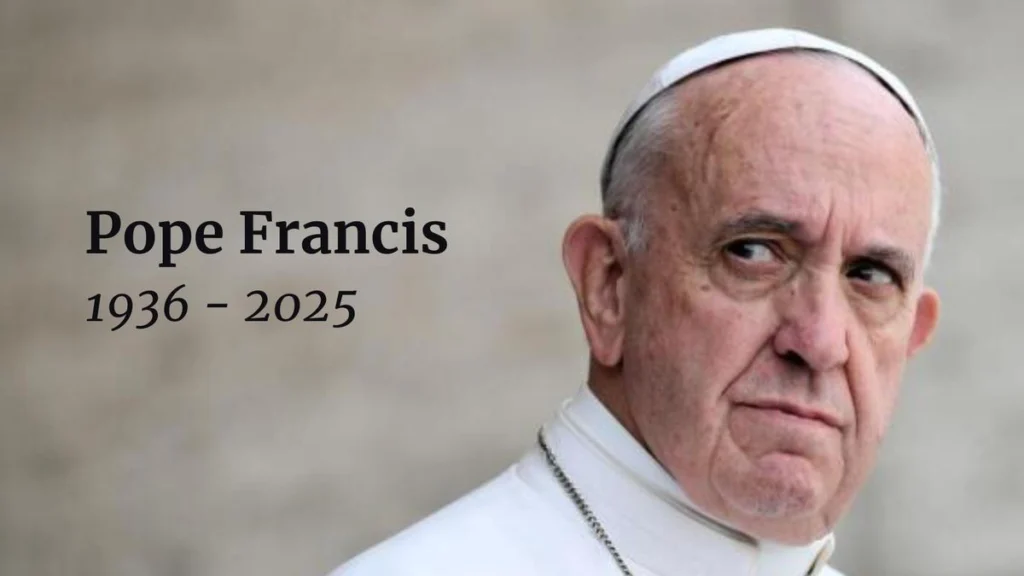Pope Francis, first Latin-American to head the Catholic Church, passes away at 88

Pope Francis, First Latin American Leader of the Catholic Church, Passes Away at 88
Pope Francis, the first Latin American pontiff in the history of the Roman Catholic Church and a beloved global spiritual figure, passed away at the age of 88, the Vatican confirmed in a video statement on Monday. News of his passing has sparked a global wave of mourning, reflection, and remembrance, as people across faiths recall the legacy of a leader who championed compassion, humility, and inclusion.
His death marks the end of a transformative papacy that reshaped perceptions of the Catholic Church and challenged centuries-old norms with a focus on empathy and reform.
A Humble Beginning, A Historic Rise
Born as Jorge Mario Bergoglio in 1936 in Buenos Aires, Argentina, he grew up in a modest home as the child of Italian immigrants. He originally trained as a chemical technician before choosing a life of spiritual service by joining the Jesuit order — known for intellectual depth, discipline, and social justice.
In a moment that stunned the world, the College of Cardinals elected him as the 266th pope on March 13, 2013, after Pope Benedict XVI resigned. His elevation marked several firsts: he became the first pope from the Americas, the first Jesuit pope, and the first non-European pope in more than 1,200 years.
By selecting the name “Francis” — in honor of Saint Francis of Assisi — he immediately signaled the direction he intended to take: a papacy rooted in humility, simplicity, and care for the poor and the planet.
A Papacy of Mercy and Meaning
Right from the start, Pope Francis stood apart from his predecessors. Rather than residing in the grand Apostolic Palace, he chose the modest Casa Santa Marta guesthouse inside the Vatican. He often carried his own bag, traveled in small cars, and interacted directly with people at every opportunity.
His emphasis on mercy over judgment became a defining theme. He urged the Church to move beyond rigid doctrines and instead walk alongside the marginalized — the poor, the displaced, the sick, and the outcast.
Notably, he softened the tone of the Church on sensitive issues such as homosexuality, divorce, and interfaith dialogue. Though he did not change core doctrine, his compassionate tone helped many feel more welcomed within the Church.
A Global Moral Voice
Pope Francis extended his influence beyond the boundaries of religion. Through papal encyclicals like Laudato Si’ and Fratelli Tutti, he addressed climate change, inequality, migration, and the erosion of human connection in a digital world.
He frequently visited conflict zones and refugee camps, bringing a message of peace and solidarity. His meetings with leaders of other faiths — including historic moments with Muslim, Jewish, and Eastern Orthodox leaders — reflected his commitment to interfaith unity.
In a time of rising nationalism and social division, his consistent call for compassion, dialogue, and fraternity resonated with millions.
Not Without Controversy
While many saw Pope Francis as a progressive reformer, others found his approach too liberal or ambiguous. Traditionalists criticized him for blurring the lines of long-held doctrines, while some reformers felt he didn’t go far enough.
He also faced criticism over the Church’s handling of sexual abuse cases. Although he eventually introduced stronger reporting mechanisms and met with victims, critics argue his initial responses lacked urgency.
Nonetheless, he remained open to dialogue and reform. He apologized publicly when needed and often sought counsel from outside voices — a rarity in Vatican culture.
A Pope of the People
For many, Pope Francis became more than just the Bishop of Rome — he was a relatable, father-like figure who embodied what it meant to serve. He embraced disfigured individuals without hesitation, kissed the feet of prisoners, and encouraged clergy to “smell like the sheep” — to live among the people.
He skipped protocol, phoned people who wrote him letters, and made jokes with children and journalists alike. Through these simple acts, he made a vast institution feel more human.
Global Response to His Passing
News of his death triggered heartfelt tributes from across the world. Political leaders, religious figures, and everyday citizens expressed admiration for his legacy.
Churches worldwide rang bells in his honor, while cathedrals hosted vigils and special Masses. Social media platforms filled with messages of gratitude, remembrance, and prayer.
Argentina, his homeland, declared national mourning. The Vatican began preparations for his funeral rites, with hundreds of thousands expected to pay their respects in the coming days.
What Happens Next?
With the passing of Pope Francis, the Vatican will soon convene a papal conclave, bringing together cardinals from around the world to elect the next pope. Until then, the Church enters a period of mourning and reflection, honoring the life and impact of one of the most beloved spiritual leaders in modern history.
A Lasting Legacy
Pope Francis may be gone, but his influence will endure. His call for a more inclusive, merciful, and environmentally conscious Church transformed not just Catholicism, but global moral conversations.
He will be remembered as a bridge-builder, a reformer, and a servant leader — one who put the world’s most vulnerable at the center of his mission. In choosing simplicity, he showed strength. In choosing mercy, he offered hope.
And in the hearts of millions, he will forever remain Papa Francesco — the people’s pope.






